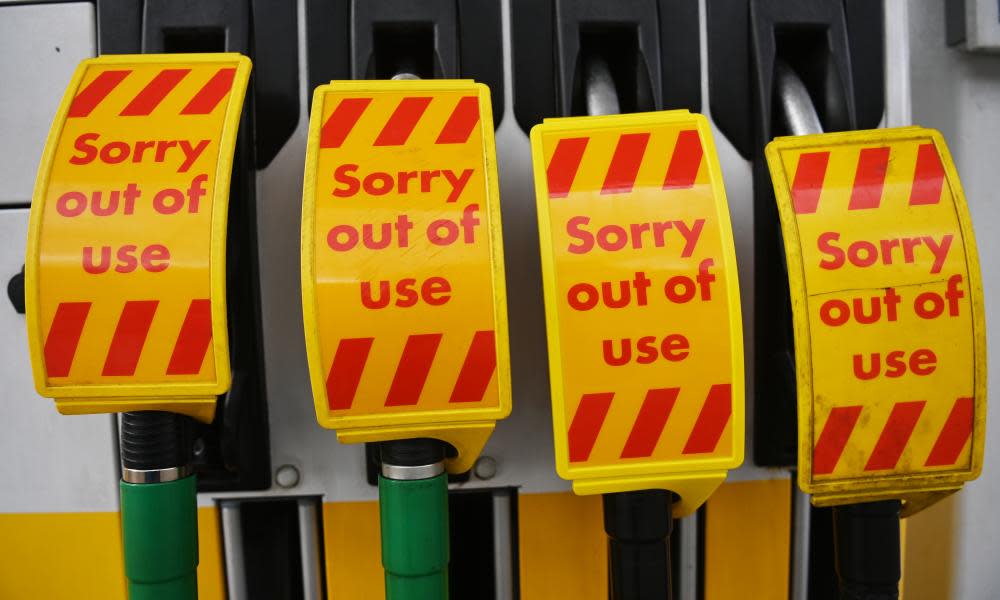UK fuel prices hit eight-year high as petrol stations run dry

Pump prices for fuel in the UK have reached their highest level in eight years as petrol stations run dry amid panic buying, with a further jump expected as wholesale energy costs continue to surge.
Figures from the RAC show the average price of a litre of petrol rose from 135.9p on Friday to 136.6p on Sunday, the highest level since September 2013, as motorists scrambled to fill up their vehicles.
Figures from Experian Catalist show average diesel prices rose from 138.0p a litre on Friday to 138.6p on Sunday. However, the AA said drivers and businesses would be hurt most by a 5p rise in the wholesale price of diesel since early September.
Related: Health workers should be given priority access to fuel in UK, says senior doctor
As queues continued to form at forecourts on Monday after a chaotic weekend, the motoring group warned that prices could rise further this autumn as the global oil price soars to its highest level in three years.
It said some retailers had also taken advantage of panic-buying by ramping up prices, but reiterated there was no shortage of fuel at refineries and called on motorists only to buy what they immediately needed.
“When it comes to pump prices, it is a pretty bleak picture for drivers. With the cost of oil rising and now near a three-year high, wholesale prices are being forced up, which means retailers are paying more than they were just a few days ago for the same amount of fuel,” said Simon Williams, the RAC’s fuel spokesperson.
“We might yet see higher forecourt prices in the coming days, irrespective of the current supply problem.”
Oil prices on the global energy markets rose for a fifth straight day on Monday, with the price of Brent crude hitting almost $80 (£58) a barrel, the highest since October 2018, amid supply concerns and rising demand across a world emerging from lockdown.
It comes as the government faces pressure over its management of the economy, with households braced for a difficult winter of rising living costs as ministers prepare to cut universal credit benefits and increase national insurance contributions.
Labour said the combined effects of the energy crisis, benefit cuts and tax rises had caused a “perfect storm” that would disproportionately hurt working families. Jonathan Reynolds, the shadow work and pensions secretary, said: “It is not too late for the government to change course, cancel their cut to universal credit and back struggling families this winter.”
Major fuel retailers, including BP, Shell and Esso, issued a statement on Monday evening suggesting queues at forecourts were likely to ease now most people had filled their tanks and urged the public to return to normal fuel-buying patterns.
“There is plenty of fuel at UK refineries and terminals, and as an industry we are working closely with the government to help ensure fuel is available to be delivered to stations across the country,” they said.
“As many cars are now holding more fuel than usual, we expect that demand will return to its normal levels in the coming days, easing pressures on fuel station forecourts. We would encourage everyone to buy fuel as they usually would.”
Hoyer, which delivers petrol for BP, also urged motorists to stop panic buying. The German-owned company said: “We are 100% focused on our delivery operations and deliveries are getting through nationwide.
“However, as long as people continue to buy or store fuel that they don’t need then it will be difficult to replenish sites. We once again urge people to calm down, fuel up when they need to and the situation will then be able to recover.”
Figures from HSBC UK suggested Friday was the busiest day for spending at petrol stations in recent memory. Payments increased by 50% from the same day a week earlier, according to the bank’s data, with consumers spending just over £30 on average compared with just over £20 for a normal Friday.
Economists said rising petrol prices would add to inflationary pressures, while persistent shortages could knock consumer confidence and drag down economic activity if households and businesses started to restrict their travel.
The Bank of England warned last week that higher energy costs would push inflation above 4% this winter, with the gauge for the cost of living expected to remain at persistently high levels until at least the middle of next year.
George Buckley, an economist at the Japanese bank Nomura, said: “We remain concerned about the risk that higher energy prices, lower confidence, and rising virus case numbers could yet scupper the nascent [UK] economic recovery.”

 Yahoo Movies
Yahoo Movies 
